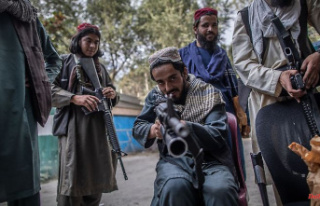A tyrannical caliphate rules in Iran under Ayatollah Ali Khamenei - even his closest family circle finds these clear words. Khamenei's sister calls on the Revolutionary Guards to lay down their arms immediately. Meanwhile, experts believe that the headscarf requirement is far from overturned.
After the niece, Ayatollah Ali Khamenei's sister also opposed Iran's spiritual and political leader. "I think it's time to declare that I am against the actions of my brother," wrote Badri Hosseini Khamenei in a letter published on the Twitter account of her French-based son Mahmoud Moradchani. She sharply criticized him for not listening to the voice of the Iranian people. "I also offer my condolences to all the mothers who suffer from the crimes of the Islamic Republic from the time of Khomeenei to the current era of Ali Khamenei's tyrannical caliphate."
She called on the Iranian Revolutionary Guards to lay down their arms and support the people "before it's too late". The letter is dated "December 2022". Badri Hosseini Khamenei lives in Iran. At the end of November, her daughter Farideh Moradchani called for Iran's international isolation in a video message. She justified her call with the violent action taken by security forces against demonstrators. She was arrested. Moradchani's recently deceased father, Ali Moradchani Arange, was a Shia cleric and prominent opposition figure.
Meanwhile, numerous people in Iran are following the nationwide protest calls. For example, numerous shopkeepers in Iran have not opened their shops for the third day in a row. This was reported, among other things, by residents of the province of Kurdistan. The state has already assembled a massive contingent of security forces in the region. Armored vehicles are also said to have been stationed in the barracks.
In the capital, Tehran, eyewitnesses reported a tense situation out of concern about riots. However, many shops initially remained open there. An earthquake warning in the afternoon caused confusion. The warning, which was presumably triggered by a hacker attack, asked all recipients to leave their homes. A hacker attack was later denied by the authorities, it is said to have been a failed warning test.
President Ebrahim Raisi was combative at a meeting with students loyal to the system. He reiterated his claim that the US was fueling the protests and wanting to destroy Iran. However, observers see it as a maneuver to distract from the real causes of the protests.
Iran's head of state, Ayatollah Ali Khamenei, met with the Supreme Council of the Cultural Revolution on Tuesday. The meeting with Raisi, Speaker of Parliament Bagher Ghalibaf and Chief of Justice Gholam-Hussein Mohseni-Ejehi is said to have been about a possible decision on the future of the Vice Police. According to experts, the headscarf requirement could continue to be pursued even if the notorious unit were abolished, for example through video surveillance.
Former Iranian President Mohammed Khatami warned the country's leaders against further crackdown on the protests. "One should not use security as an excuse to suppress freedom," the Islamic cleric was quoted as saying by the daily Shargh. Chatami warned to take the demands seriously. The protest movement demands a better future with the "beautiful slogan: woman, life, freedom". Politicians should shake hands with her "before it's too late".
Khatami was president between 1997 and 2005. But Khatami is also rejected as a "man of the system", especially by young supporters of the protest movement. As an Islamic cleric, the ex-president advocates compulsory headscarves. In mid-November he had rejected calls for a political system change. According to observers, however, Khatami could play an important mediating role in the deadlocked political situation.
However, the majority of the demonstrators believe that reforms are impossible and are calling for a change of power. The protests in mid-September were triggered by the death of the Iranian Kurd Jina Mahsa Amini. She died in police custody after being arrested for allegedly violating Islamic dress codes. According to estimates by human rights activists, at least 470 demonstrators have been killed and around 18,000 people arrested since then.












